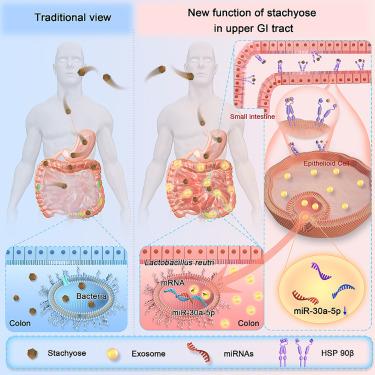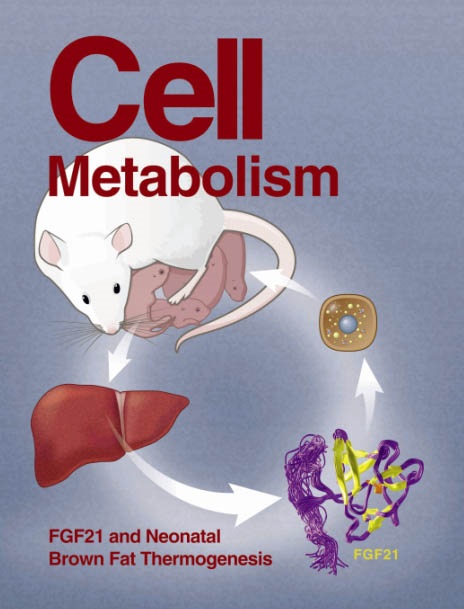非消化性水苏糖与小肠上皮细胞上的膜HSP90β结合以调节外泌体miRNA:一种新的功能和机制
IF 27.7
1区 生物学
Q1 CELL BIOLOGY
引用次数: 0
摘要
低聚糖通常被认为是小肠中的 "过客"。然而,我们的研究通过发现水苏糖低聚糖的新功能,重塑了这一认识。水苏糖低聚糖能与小肠上皮细胞膜HSP90β的疏水残基结合,从而重编程外泌体miRNA谱。CRISPR-Cas9 介导的 HSP90β 基因敲除可消除水苏糖在细胞膜上的积累及其对这些 miRNA 的调控作用。值得注意的是,水苏糖对这些 miRNA 的调控作用与其益生作用无关,这一点可以从假性无胚胎小鼠粪便中水苏糖改变的 miRNAs 观察到。这些水苏糖改变的 miRNA 进一步塑造了小鼠的结肠微生物组,尤其是乳酸杆菌。因此,在水苏糖处理后,小鼠和人类粪便中下调(Log2FC <-2)的miR-30a-5p能特异性地抑制再特异性乳酸杆菌的生长。这些发现构建了水苏糖-肠道 miRNA-肠道微生物群的新调控轴,并揭示了之前未知的低聚糖通过膜 HSP90β 与肠上皮细胞直接 "对话 "的机制。本文章由计算机程序翻译,如有差异,请以英文原文为准。

Nondigestible stachyose binds membranous HSP90β on small intestinal epithelium to regulate the exosomal miRNAs: A new function and mechanism
Oligosaccharides are conventionally recognized as “passersby” in the small intestine. However, our research has reframed this understanding by uncovering a new function of oligosaccharide stachyose, which binds hydrophobic residues of membranous HSP90β on small intestinal epithelial cells, thus reprograming the exosomal miRNA profile. CRISPR-Cas9-mediated HSP90β knockout abolished the accumulation of stachyose on cell membrane and its regulatory effects on these miRNAs. Notably, stachyose’s regulation on these miRNAs is independent of its prebiotic role, as evidenced by the observation of stachyose-altered fecal miRNAs in pseudo-germ-free mice. These stachyose-altered miRNAs further shaped colonic microbiome, especially harboring Lactobacillus in mice. Thereinto, miR-30a-5p that was downregulated (Log2FC < −2) in both mice and human feces following stachyose treatment could specifically suppress the growth of Lactobacillus reuteri. These findings build a new regulatory axis of stachyose-intestinal miRNAs-gut microbiota and unveil a previously unknown mechanism underlying the direct “talk” of oligosaccharides to intestine epithelium via membranous HSP90β.
求助全文
通过发布文献求助,成功后即可免费获取论文全文。
去求助
来源期刊

Cell metabolism
生物-内分泌学与代谢
CiteScore
48.60
自引率
1.40%
发文量
173
审稿时长
2.5 months
期刊介绍:
Cell Metabolism is a top research journal established in 2005 that focuses on publishing original and impactful papers in the field of metabolic research.It covers a wide range of topics including diabetes, obesity, cardiovascular biology, aging and stress responses, circadian biology, and many others.
Cell Metabolism aims to contribute to the advancement of metabolic research by providing a platform for the publication and dissemination of high-quality research and thought-provoking articles.
 求助内容:
求助内容: 应助结果提醒方式:
应助结果提醒方式:


